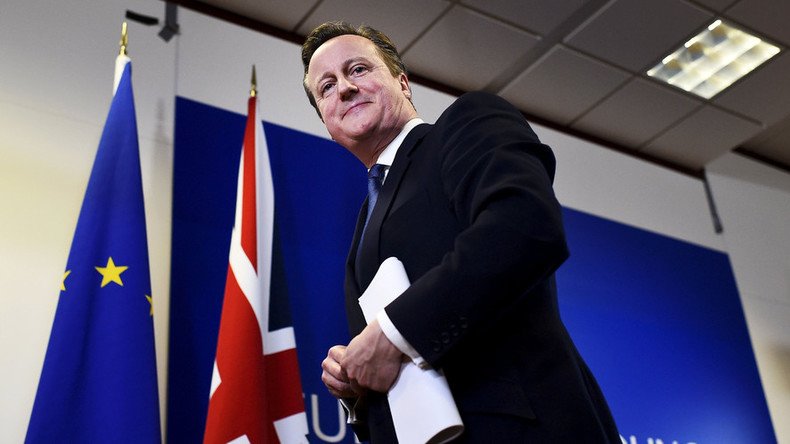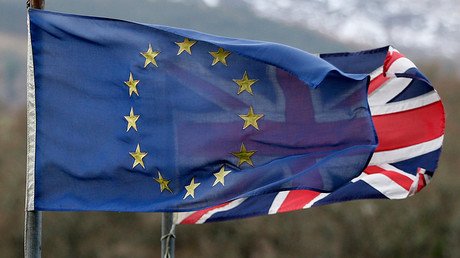‘Brexit’ deal: EU may have signed its own death warrant

David Cameron's deal with Brussels gives him a fighting chance of winning the so-called Brexit referendum. But it also sets a dangerous precedent for the EU.
Umberto Eco once observed that “the language of Europe is translation.” He also opined about how “people are tired of simple things. They want to be challenged.” Eco departed this world on Friday, just as the leaders of Britain and the European Union were confirming his perceptions.
After two days of theatrical drama, David Cameron and his European colleagues emerged with a deal designed to keep the United Kingdom in the EU. The Prime Minister indicated that all had changed, and changed utterly. However, the reality is different.
Already, Cameron’s own cabinet is divided. Reports indicate that his justice secretary, Michael Gove, intends to campaign for a ‘Brexit’. There is also speculation that London’s Mayor Boris Johnson - hotly tipped to become the next Conservative leader - is ready to oppose his PM. Meanwhile, polls indicate that the British public are almost evenly split on whether to remain in the EU or leave. The latest survey shows the exit camp holding a, slender, 2 percent lead.
While he was all smiles last night, in the safe surroundings of Brussels, Cameron knows that the deal will be a harder sell back home. Sure, he’ll have state-controlled media and much of the corporate press on his side. Big business will, largely, support him and most of the establishment. Yet, the British people, concerned with mass immigration and ridiculous housing-costs, will be a far tougher audience than the Eurocrats he faced this week.
Silly promises
Of course, the irony is that Cameron brought these problems upon himself. Just as he sleepwalked into the Scottish referendum of 2014. By making promises, to win domestic campaigns, without fully comprehending the consequences.
The roots of the ‘Brexit’ referendum can be found in the 2005 Conservative Party leadership election, after the party had been routed by Labour for the third consecutive time. Following the first round of voting, Cameron trailed David Davis, a right-wing MP who supported the reintroduction of the death penalty and a British withdrawal from the EU.
Back then, the Tories harbored so many hardliners that the current PM was seen as a kind of ‘leftie’ within his own party. So, to harden his image, he postured as a ‘Euroskeptic’. Promising to withdraw the Conservatives from the European People’s Party grouping - which also contains Angela Merkel’s CDU - went down well with the Tory base. Naturally, on the flip side, it also greatly diminished British influence in Brussels.
Later, in 2013, terrified by the rise of UKIP, which threatened to cannibalize Conservative support domestically, he offered an in/out referendum to court voters who were attracted to Nigel Farage’s group. Cameron’s strategy helped to deliver a Conservative majority in the 2015 election. Nevertheless, it also left him in a pickle. The PM had essentially used Europe to win a local squabble.
He’d also made a lot of people angry. The White House, used to dictating foreign policy to London, quickly steamed in to slam the plan. French President Francois Hollande ordered the UK to “leave” Europe, after Farage upset him during a Strasbourg debate. Even faraway Japan criticized Cameron’s proposal.

Crystal ball gazing
Now, Cameron’s future depends on securing a ‘yes’ vote in the forthcoming referendum, likely to be held on June 23. If he fails, he’ll have no option but to resign as prime minister.
The deal secured in Brussels on Friday night isn’t spectacular, although it’s also not as lightweight as many Euroskeptics profess. Other European leaders, obviously horrified at the thought of a Brexit, have conceded significant ground to Cameron. He achieved promises on British abstention from an “ever-closer union” and recognition that the Euro is not the only EU currency.
However, the bloc's eastern members scuppered his most ambitious demand. That Britain could “control migration from the EU by reforming welfare rules.” Cameron, in the 2015 Tory manifesto, had promised that no child benefits would be paid to UK workers if their children lived abroad. He also pledged that EU migrants would be unable to claim ‘jobseekers allowance’ (the Dole) and would be forced to leave the country if unemployed for more than six months.
Shattered hopes
Cameron completely failed on the issue that most annoys British voters. Unfettered immigration and the abuse of the nation’s (relatively generous) social welfare system. Instead, he got a watered-down sop on child benefit, where the offspring of ‘new migrants’ would receive child benefit at the levels of their country of residence.
In other words, Cameron earned reasonable victories on the minutiae but failed the biggest test. It was like a football player dribbling past five defenders and then missing the target from 2 meters out.
A Brexit might be avoided. Cameron may save himself and his country’s membership of the EU. Or, six months from now, Prime Minister Boris Johnson could be leading a newly-sovereign Britain away from Brussel’s oversight. That’s for British voters to decide.
However, the damage the PM’s short-termism has rendered to the EU is beyond comprehension. Now, every anti-EU politician will know that by threatening to leave they can force Brussels to make special exemptions for their country. How long before somebody like Nicholas Sarkozy embraces Euroskepticism - to fight off Marine La Pen’s populist appeal - and France is also looking for a special deal? Or Italy? Or Spain? Or Holland?
On Friday night, Eurocrats set a dangerous precedent. One that may hasten the EU’s demise. It might come back to haunt them.
The statements, views and opinions expressed in this column are solely those of the author and do not necessarily represent those of RT.














